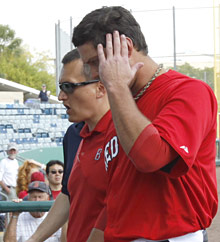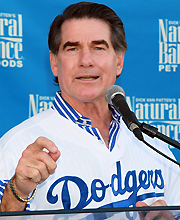Everyone was tired. It was a few minutes before 2 a.m. ET on Wednesday. A rookie catcher named
Mike McKenry barely could summon enough oomph to toss the ball back to the mound.
Daniel McCutchen(notes), a reliever, was throwing his sixth inning. He hadn’t gone more than three all year. On third base was
Julio Lugo(notes), a veteran who went unsigned all spring and didn’t arrive in the major leagues until a month ago.
Scott Proctor(notes) was at-bat. He’s a pitcher whose last plate appearance came June 23, 2007. This was bizarro baseball, for the insomniacs and werewolves.
Behind the plate stood a man named Jerry Meals. He turns 50 years old in October and has umpired baseball games for more than half that time. He stood alone, then and about five seconds later, when he made what in the immediate aftermath was deemed the worst call ever.
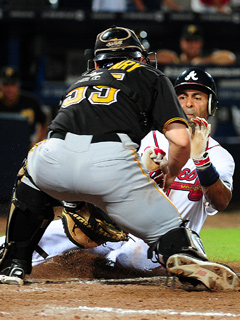
Atlanta’s Julio Lugo slides into home plate as a tag is applied by Pittsburgh catcher
Michael McKenry(notes) in the 19th inning. Lugo was called safe giving the Braves a 4-3 victory.
(Getty Images)
Surely there have been worse. Hyperbole trades in currency today, everything bigger than it seems. Only this was big. This was big and bad. This was so big and so very bad. This stoked the ire of the aggrieved (the
Pittsburgh Pirates) as well as that of the beneficiaries (the
Atlanta Braves). This, the mother, grandmother, great-grandmother and all the way back to Eve of big and bad calls, came in the bottom of the 19th inning of a game that had gone 15 1/3 consecutive scoreless frames, 91 outs without a run, a delicious late-night munchy of a game before Jerry Meals relieved himself all over it.
The Braves won 4-3, and amid the hysteria, the implosion of Twitter and the caterwauls from Pittsburgh and the shoulder shrugs from Atlanta, one question, beyond that of how Jerry Meals managed to blow it, remained.
What the hell is Major League Baseball still doing without instant replay?
There is no rational answer to this question, of course. Pilots can take crazy-resolution pictures from miles in the air. High-definition television makes it seem like athletes’ sweat is about to pour through the screen. Video imaging can slow events down to millions of frames per second. All of this technology, and baseball refuses to institute widespread replay. It might be the only thing in America dumber than the debt-ceiling fight.
Here’s what happened in the wee hours Wednesday: With runners on first and third and one out in the bottom of the 19th, McCutchen threw an 85-mph changeup, which Proctor grounded toward third base.
Pedro Alvarez(notes) gloved it and fired a perfect strike home. McKenry grabbed it, swiped a tag on Lugo’s leg and looked at Meals to ensure he punched his fist for an out.
He didn’t. Meals hesitated for the slightest moment, swung his arms outward to signal safe, ended the game, prompted a celebration from the Braves, endured a purple-faced rant from Pirates manager Clint Hurdle, escaped to the umpires’ dressing room as his name entangled itself with Jim Joyce’s in the annals of umpiring gaffes and offered this meager explanation:
“I saw the tag, but he looked like he oléd him and I called him safe for that. I looked at the replays and it appeared he might have got him on the shin area. I’m guessing he might have got him, but when I was out there when it happened I didn’t see a tag. I just saw the glove sweep up. I didn’t see the glove hit his leg.”
Meals screwed up, just like Joyce did last year when he stole a perfect game from
Armando Galarraga(notes) with a blown call. Joyce’s life changed that day. Immediately reviled, he soon found comfort in the embrace of the legions of baseball fans who saw his contrition the night of his blunder – his tears, his vulnerability, his fallibility. Jim Joyce was each of us. He biffed one. He felt miserable. He used the support of others to move past it.
There was no such apology from Meals. It might come, if only to ease the pain of knowing that the profession to which he has devoted 29 years now will remember him, more than anything, for absolutely butchering a call.
Everybody wins with instant replay. It absolves umpires when their eyes deceive them, something, as Joyce showed, that can happen to even the best. It affirms borderline calls they do make correctly. Above all, it ensures fairness, impartiality and accuracy. And it prevents debacles such as the Joyce call and the Meals call.
Baseball’s commissioner, Bud Selig, is instant replay’s enemy. He tries to portray himself as a moderate on the subject. After all, replay didn’t exist until Selig unilaterally implemented it for home run calls on Aug. 28, 2008. The system, by all accounts, has been successful for its intended use. Naturally, baseball does nothing to expand the technology.
Selig said at the All-Star game he planned on expanding replay to include balls hit down the baselines, an admirable addition but the equivalent of trying to kill an army of slugs with a grain of salt. Why do down-the-line judgment calls necessitate replay any more than a play at a base? The answer is because Bud Selig says so.
Baseball applies no logic to replay, no whit of rationale. Selig and his anti-replay brigade muddle the argument by saying how replay would slow the game down, ignoring the fact that baseball is slower than ever because under his watch the sport instituted longer breaks in between innings to sell more commercials. Selig lost the moral argument long ago, and the lemmings that buy it need to stop and understand the imperative.
Get. It. Right.
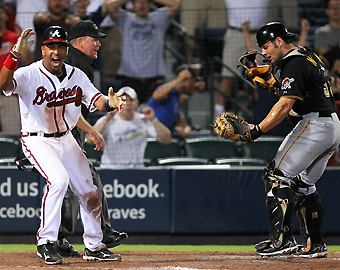
Pirates catcher Michael McKenry stares at his glove after home plate umpire Jerry Meals ruled Julio Lugo was safe with the winning run in the 19th inning.
(US Presswire)
That’s the duty of every umpire: Be correct. This isn’t about protecting baseball’s human element. The idea that a person’s capability to miss a call supersedes the ability to use technology and ensure accuracy is so insulting, so wildly backward that it could come only from the offices of Major League Baseball.
There are a million replay plans out there, each better than the current one.
This one, offered after the Joyce call last season, proposes that objective rulings – like, did a ball land fair: yes or no?; or did McKenry tag Lugo: yes or no? – are subject to replay, while things such as balls and strikes, check swings and balks remain outside the purview of video. It is a reasonable plan. Games will go longer, sure.
They also won’t end with an umpire’s Baseball-Reference wiki hacked to say that his full name is “Gerald McFail Meals,” from “Failboat Springs, Canada.”
Poor Mike McKenry from the poor Pittsburgh Pirates wore the saddest face of the 2011 season early Wednesday morning. His team entered the night leading the National League Central, the surprise of baseball, and this would have been the season’s apex thus far, a gut-it-out win against the team ahead in the NL wild-card race.
McKenry had caught all 18 1/3 innings, crouched for all 303 pitches, destroyed his knees for 6 hours, 39 minutes of baseball, and this was how it ended: with the worst call ever, or at least the worst call he and his teammates and anyone at the ballpark had ever seen, worse, probably, than the call from the junior high kid who blew one at the Little League game in your city last week and worse, maybe, than that time the umpire who didn’t like you called a third strike just for the hell of it and worse, almost certainly, than the time Jim Joyce did what Jim Joyce did.
On the replay, you could read McKenry’s lips: “I did too tag him.” Though Meals’ back was turned, McKenry must’ve retorted to a damning phrase the umpire used to explain: “You didn’t tag him.”
Except he did. All different angles, the TV broadcast showed, replaying them just to make sure: the right, the left, high in the air and low on the ground. Each showed the same: McKenry’s glove swiped Lugo’s leg. He was out, a definitive yes. Already Meals had spent the night making a mockery of the strike zone, inflaming the Braves so much that outfielder
Nate McLouth(notes) and manager Fredi Gonzalez found themselves ejected. This was the rotten cherry atop the moldy cake.
[
Related: Stunning call may affect NL pennant race]
Before the broadcast cut out, one of those cameras zoomed in on McKenry. He didn’t know what to say, what to do. He was still wearing his chest protector. The Pirates had lost this epic game. He had lost this epic game.
What he didn’t realize amid his grief was that another party lost Wednesday: Baseball, the sport that refuses to do right, that keeps losing and losing and losing, too stubborn and arrogant to know any better.
Just like Jerry Meals, all alone.










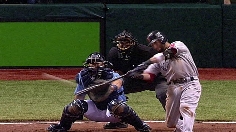
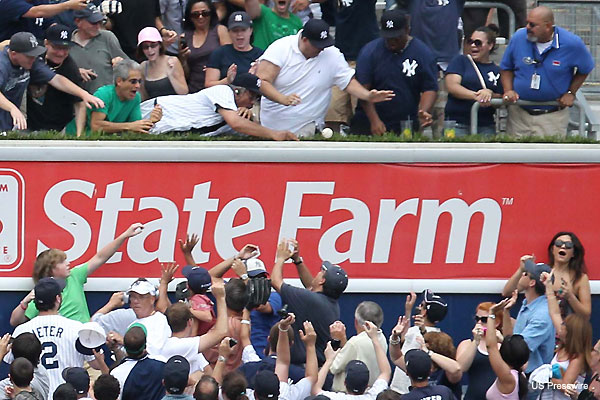
 "No, not really," Lopez said when Yankees announcer Michael Kay later asked him if he asked for anything in return. "He deserves this, he's worked hard for this ... I'm not the type of person to take this away from him."
"No, not really," Lopez said when Yankees announcer Michael Kay later asked him if he asked for anything in return. "He deserves this, he's worked hard for this ... I'm not the type of person to take this away from him."